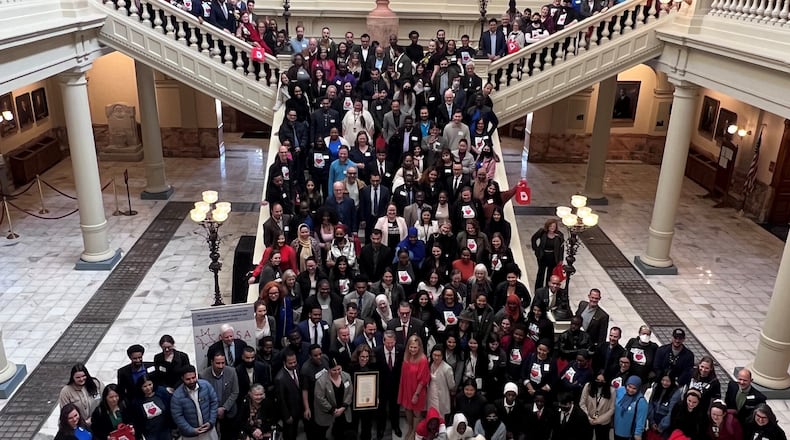Roughly 300 immigration advocates congregated at the Georgia State Capitol on Tuesday, where they pushed for immigrant friendly policies and touted foreign-born workers’ contributions to the Georgia economy.
This was the 10th annual visit that members and allies of the Coalition of Refugee Service Agencies paid to the Legislature — a tradition they’ve dubbed New Americans Celebration Day. For the first time, this year’s visit included a photo with both the governor and first lady, something immigration advocates view as a symbol of their growing acceptance and influence in state government.
“This is a bipartisan movement to recognize the importance of immigrants and refugees in Georgia,” said Darlene Lynch, co-chair of CRSA.
Lynch and others explained that several key factors are aligning to maximize the bipartisan appeal of CRSA’s core legislative agenda. The group aims to lower barriers to higher education and update occupational licensing rules that keep some immigrants from fully participating in the state’s economy.
First, Lynch said, is the current “workforce crisis,” with many Georgia businesses struggling to find qualified labor. Last year, Georgia Chamber of Commerce leadership said the labor shortage was the biggest hurdle facing the state’s economy.
Another source of hope for immigrant advocates is the growing diversity within the state’s legislative body. Dubbed the most diverse in Georgia history, the current Legislature includes a record number of immigrant lawmakers.
“Things have changed. ... My God, when I was here at first, there was no coalition. I was here by myself,” said state Rep. Pete Marin, a Democrat from Duluth and one of the first Latinos elected to the General Assembly. “I’m glad that things have changed. There are more people at the table. We have more elected representatives that show the new face of Georgia.”
During Tuesday’s Capitol visit, immigrant advocates threw their support behind House Bill 131, the “Workforce Development Act,” which seeks to extend tuition rates comparable to in-state tuition to the beneficiaries of the Deferred Action for Childhood Arrivals program, or DACA. The program provides relief from deportation to certain unauthorized immigrants brought to the U.S. as children.
House Bill 131 is sponsored by two Democrats, including Marin, and four Republicans.
On Tuesday, members of both the Democratic and Republican caucuses were among the lawmakers who sponsored resolutions introduced in both the House and Senate recognizing immigrants’ contributions to the state and its economy.
CRSA noted than an additional legislative goal is for Georgia to also grant in-state tuition access to recent evacuees from Afghanistan and Ukraine, most of whom are residing legally in the state through a temporary parole program.
Husnia Jamal is an Afghan parolee who arrived in Georgia in the fall of 2021. Fighting back tears, she said she was disappointed when she realized out-of-state tuition rates at Georgia State University would make it impossible for her to pursue a degree there.
“It’s really hard for me. As a young Afghan woman, I already faced lots of discrimination and inequality in my home country. … The story of Afghan women right now is that they are not allowed to go to school, they are not allowed to go to university. Everything is really hard for them. … But I’m in this country now,” she said. We “need help to get education in Georgia.”
But support is lacking for proposals to increase immigrants and refugees access to public education. As recently as last year, legislative proposals to extend in-state tuition to DACA recipients and refugees proved unsuccessful.
But economic concerns could tilt the political outlook, advocates said.
Among the sponsors for House Bill 131 is state Rep. Long Tran, a Democrat from Dunwoody and the son of refugees from Vietnam. Like other speakers on Tuesday, he said that initiatives that seek to unlock the educational and professional potential of immigrant residents would be beneficial to the state’s economy.
“I believe access to affordable education is key to immigrants’ rise in America,” he said. “We are going to invest in you guys because we know it pays dividends for our state.”
The Atlanta Journal-Constitution and Report for America are partnering to add more journalists to cover topics important to our community. Please help us fund this important work at ajc.com/give
About the Author
Keep Reading
The Latest
Featured



